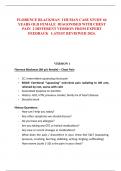FLORENCE BLACKMAN I HUMAN CASE STUDY 66 YEARS OLD FEMALE DIAGONISED WITH CHEST PAIN 2 DIFFERENT VERSION FROM EXPER T FEEDBACK LATEST REVIEWED 202 4. VERSION 1 Florence Blackman (66 y/o female) – Chest Pain • CC: Intermittent squeezing chest pain • MSAP: Exertional “squeezing” mid -chest pain radiating to left arm, relieved by rest, worse with cold • Associated dyspnea on exertion • History: HLD, HTN, previous smoker, family hx of heart disease • Stressful work History Questions: - How can I help you today? - Any other symptoms we should discuss? - Do you have any allergies? - Are you taking any OTC or herbal medications? - Any new or recent changes in medications? - What does the pain / discomfort in your chest feel like? (squeezing, pressure, crushing, burning, stabbing, aching, tingling, suffocating) - How severe (scale 1 -10) is the pain in your chest? 1 - Does anything make the pain in your chest better or worse? - What are the events surrounding the start of your chest pain? - Is there a pattern to your chest pain? - Have you had any trauma to your chest? - Does the pain in your chest radiate someplace else? Where? - Do you have unusual heartbeats (palpitations)? - Does the pain get worse with breathing? - Does your pain awaken you from your sleep? - Is your pain affected by what, when, or how much you eat? - Do you presently have heartburn, a food or acid taste in your mouth? - Do you drink alcohol? If so, what do you drink and how many drinks per day? - Do you have any of the following problems: fatigue, difficulty sleeping, unintentional weight loss or gain, fevers, night sweats? - Do you experience: SOB, wheezing, difficulty catching breath, chronic cough, sputum production? - Does anything make your shortness of breath better or worse? - How long does your SOB last? - Do you have any of the following: heat or cold intolerance, increased thirst, increased sweating, frequent urination, change in appetite? - Do you have any of the following: dizziness, fainting, spinning room, seizures, weakness, numbness, tingling, tremor? - Do you have problems with: N/V, constipation, diarrhea, coffee grounds in your vomit, dark tarry stool, bright red blood in your BM, early satiety, bloating? - How is your overall health? - Tell me about your work. - Tell me about daily exercise or sports that you play. Physical Exam: - Vitals: pulse, BP , respirations 2 - Examine skin - Neck: measure JVP (jugular venous pressure) - Neck: auscultate carotid arteries - Chest wall & lungs: o Visual inspection of anterior & posterior chest o Palpate anterior & posterior chest o Auscultate lungs - Heart: o Palpate for PMI (Point of Maximal Impact) o Auscultate heart - Abdomen: o Auscultate abdominal/femoral arteries o Palpate abdomen - Extremities: Visual inspection of extremities Assessment note: - F.B. is a 66 y/o Caucasian female presenting with 2 -week h/o new onset, intermittent, stable chest pain which radiates to the L arm, occurs with SOB, is worse with cold temperatures and exertion, and improved by rest. On physical exam she is pain free with stable vital signs. PMH risk factors include: distant history of smoking (5 pack/years), a history of HTN, and high cholesterol, and a family history of coronary vascular disease. - Stress test: 2 -mm ST segment depression in inferior leads, 2, 3, and aVF and V3 -6 Diagnosis: Coronary artery disease: stable angina Plan: - Determine need for coronary angiography based on stress test results and ECHO. Her Duke score of 10.5 is slightly above moderate risk, and arguments could be made for both a trial at medication intervention since the pt needs improvement on both HTN and HLD o Augment management of preexisting HTN and HLD with a BB (metoprolol 25 mg XR daily); a statin (atorvastatin 40 mg daily); and ASA 81 mg daily - Continue use of HCTZ 25 mg daily - Encourage lifestyle modification:




